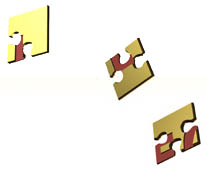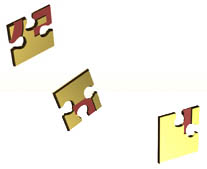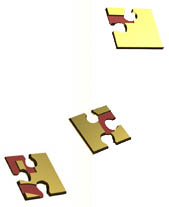| |
![]()
Vol. 71, No. 12,
December 1998
Defining the Role of Paralegals
 But even with its pursuit of licensing,
the Paralegal Association of Wisconsin never sought to push for paralegals'
independence from lawyers, says John Goudie, the group's president. "Our
intent was to formalize the profession," Goudie says. "There are
no formal standards of practice for paralegals anywhere in the United States.
And we felt it was time they were needed." Goudie acknowledges, however,
that the impression persists among many in the legal community that his
organization's legislative goal was to win the right for paralegals to practice
independently of lawyers - an impression perhaps fostered by the fact
that no one outside of the Paralegal Association of Wisconsin actually saw
the draft of the licensing bill, which never was introduced in the Legislature. But even with its pursuit of licensing,
the Paralegal Association of Wisconsin never sought to push for paralegals'
independence from lawyers, says John Goudie, the group's president. "Our
intent was to formalize the profession," Goudie says. "There are
no formal standards of practice for paralegals anywhere in the United States.
And we felt it was time they were needed." Goudie acknowledges, however,
that the impression persists among many in the legal community that his
organization's legislative goal was to win the right for paralegals to practice
independently of lawyers - an impression perhaps fostered by the fact
that no one outside of the Paralegal Association of Wisconsin actually saw
the draft of the licensing bill, which never was introduced in the Legislature.
Now, as before, Goudie says, his organization's position - like that
of the Paralegal Practice Task Force - is that paralegals should be
working with attorneys. "We're not talking about paralegals hanging
out their shingles, about providing services directly to the public,"
he says. "We're setting standards to assure that the paralegals who
are providing legal services with the supervision of attorneys are qualified
to do so. We see that as being important to our profession, and we think
it can be beneficial to the delivery of legal services in Wisconsin. That's
the key focus here."
Still, the fear runs deep that by taking steps to officially recognize
paralegals, attorneys will set the stage for future competition. Give paralegals
sufficient stature, so the argument goes, and soon they will be running
their own businesses, with lawyers cut out of the picture.
Waukesha attorney and task force member Cornelius (Casey) Andringa takes
an opposite view: Continue to avoid dealing with the place of paralegals
in the legal profession, and they most certainly will become competitors.
"I liken it to the days when doctors stuck their heads in the sand
about chiropractors," Andringa says. "The chiropractors went their
own way, and now they are totally independent. Had doctors acknowledged
that chiropractors perform a service, and tried to coordinate with them,
we all might have been better off for it."
If the Bar fails to recognize the crucial role of paralegals, they will
look elsewhere for validation, such as once again pursuing licensing through
the Legislature, Andringa predicts. That would bring paralegals under the
control of the state's Department of Regulation and Licensing, which Andringa
feels "would be the wrong way to go. I don't think paralegals should
be licensed like barbers and plumbers. What would be their code of conduct?
What would be their disciplinary structure?"
Better to bring paralegals under the jurisdiction of the Wisconsin Supreme
Court, Andringa contends. "Paralegals are part of our profession,"
he says. "So let's get them inside the fold, where the supreme court
and the Bar have some influence over their work, which is so closely related
to ours. It's really part of ours."
 More work in progress More work in progress
Besides the completed paralegal definition and code of ethics, and the
grandfather clause still being written, another key component of the task
force's work is the educational criteria - covering both training for
paralegals entering the field and continuing education for those already
practicing.
Not all paralegals agree in this area, either. Many view educational
requirements as a quality control measure for their profession. Others see
such requirements, especially continuing education, as just more hoops to
jump through in order to keep doing the job they're already doing.
"I think we're looking at the integrity of the profession,"
says paralegal instructor Retzak, chair of the task force's education subcommittee.
"As an educator, I believe in lifelong learning, and this is one way
to ensure that."
Paralegals themselves stand to gain from having clear educational standards,
says Retzak. "The profession is growing," she notes, "and
there have been lots of training programs coming out over the Internet or
in videotape - the 'weekend wonders' as we call them. You watch 20 hours
of videotape, and now you're a paralegal. But we find the quality of education
is not there. People are being taken advantage of, and attorneys don't know
the difference" when they hire someone claiming to be a paralegal.
In fact, as matters now stand, nothing can stop people who have had absolutely
no paralegal training from calling themselves paralegals and offering their
services in the marketplace.
Educational standards would help ensure that those who claim to be paralegals
have indeed completed proper training, thus protecting those who do go to
the trouble and expense to attend school - as well as giving attorneys
a better idea of what they're getting when they hire a paralegal. In the
end, this also becomes a question of consumer protection. Clients have the
right to know that the paralegals their attorneys are using - and for
whose services they're being billed - are qualified.
But, some attorneys would argue, how can you devise training standards
for paralegals who ultimately may do totally different kinds of work in
different settings: small firm or large, rural or urban, private practice
or government agency? "How do attorneys do it?" Retzak counters.
"It's the same thing. When (paralegal) students graduate, even from
a four-year degree program, they still need additional on-the-job training
- just like attorneys do" when they leave law school. In fact,
her institution, Lakeshore Technical College, recommends, but does not require,
that paralegal students serve internships, much like law students work as
law clerks, to better prepare them for the world of work.
As for her subcommittee's final recommendations, still taking shape,
Retzak says they're likely to address quantity of education, but not specifics
about what types of courses that should include. "The consensus seems
to be that for Wisconsin, a two-year degree is adequate because we're such
a rural state," she explains. "We recognize in larger cities,
such as Milwaukee, Madison, or Green Bay, a lot of firms may prefer four-year
degrees" for their paralegals.
 The sum of the parts The sum of the parts
Once the task force has finalized a definition, grandfather clause, code
of ethics, and educational requirements - challenging work in itself
- then comes the even more difficult work. "After we have all the
pieces," says chairperson Barker, "then we need to fit this all
together to come up with an overall structure." That leads to numerous
questions. What will be the disciplining body for paralegals? An arm of
the Board of Attorneys Professional Responsibility? Or a completely separate
unit? Might the Board of Bar Examiners, or an equivalent, handle some sort
of licensing or certification process for paralegals?
So that these boards aren't surprised later, representatives from both
have been involved in task force discussions, as nonmembers. "It's
a little chicken and egg," Barker admits, "because obviously they
can't really get into this and decide what to do with it until they know
what we're going to recommend. But we've had good dialogue with representatives
from both boards. Our goal is to have them comfortable with whatever we
recommend, so that ultimately if and when the Bar goes to the supreme court
with a proposal, we'll be speaking with one voice."
The question remains as to whether a proposal ever will reach the Wisconsin
Supreme Court. First the task force must submit its report to the Bar's
Board of Governors and win support there. Knowing the years-long history
of controversy and conflict over this issue, task force members are realistic
about their chances, yet hopeful that, at last, real progress might be made
in bringing paralegals and attorneys to the same side of the table, rather
than on opposite sides.
"What we're going to give to the Bar as a whole is what this group
- this very diverse group - believes," says Christine Ouimet-Durow,
past-president of the Madison Area Paralegal Association. "We've put
a lot of work into this - into the definition of a paralegal, the rules
of ethics, the educational requirements. We will have done the legwork."
Dianne Molvig operates Access Information Service, a Madison research,
writing, and editing service. She is a frequent contributor to area publications.
|
